Alertas personalizados e visualização de dados permitem que você identifique e evite rapidamente problemas de saúde, disponibilidade e desempenho da rede Cisco.
Como um Parceiro Seleto de Desenvolvimento da Cisco, o PRTG da Paessler é totalmente integrado ao ecossistema da Cisco e vem com sensores especialmente desenvolvidos para dispositivos Cisco prontos para uso. Ao monitorar profissionalmente os parâmetros relacionados à Cisco, você pode esgotar todas as suas possibilidades:
Sensores adicionais usam a tecnologia NetFlow específica da Cisco para monitorar o tráfego. De conexões ADSL a VPN, até aplicativos VoIP: O PRTG garante a qualidade de seu serviço e ajuda todos a trabalharem com tranquilidade.
Diagnostique problemas de rede rastreando continuamente o desempenho e a integridade de seus dispositivos Cisco. Mostre a largura de banda, o tráfego, o VoIP, o desempenho do aplicativo, a integridade do hardware e outras métricas importantes de desempenho em tempo real. Visualize os dados de monitoramento em gráficos e painéis claros para identificar problemas com mais facilidade. Obtenha a Visão Geral necessária para solucionar interrupções e todos os tipos de problemas com sua rede Cisco.
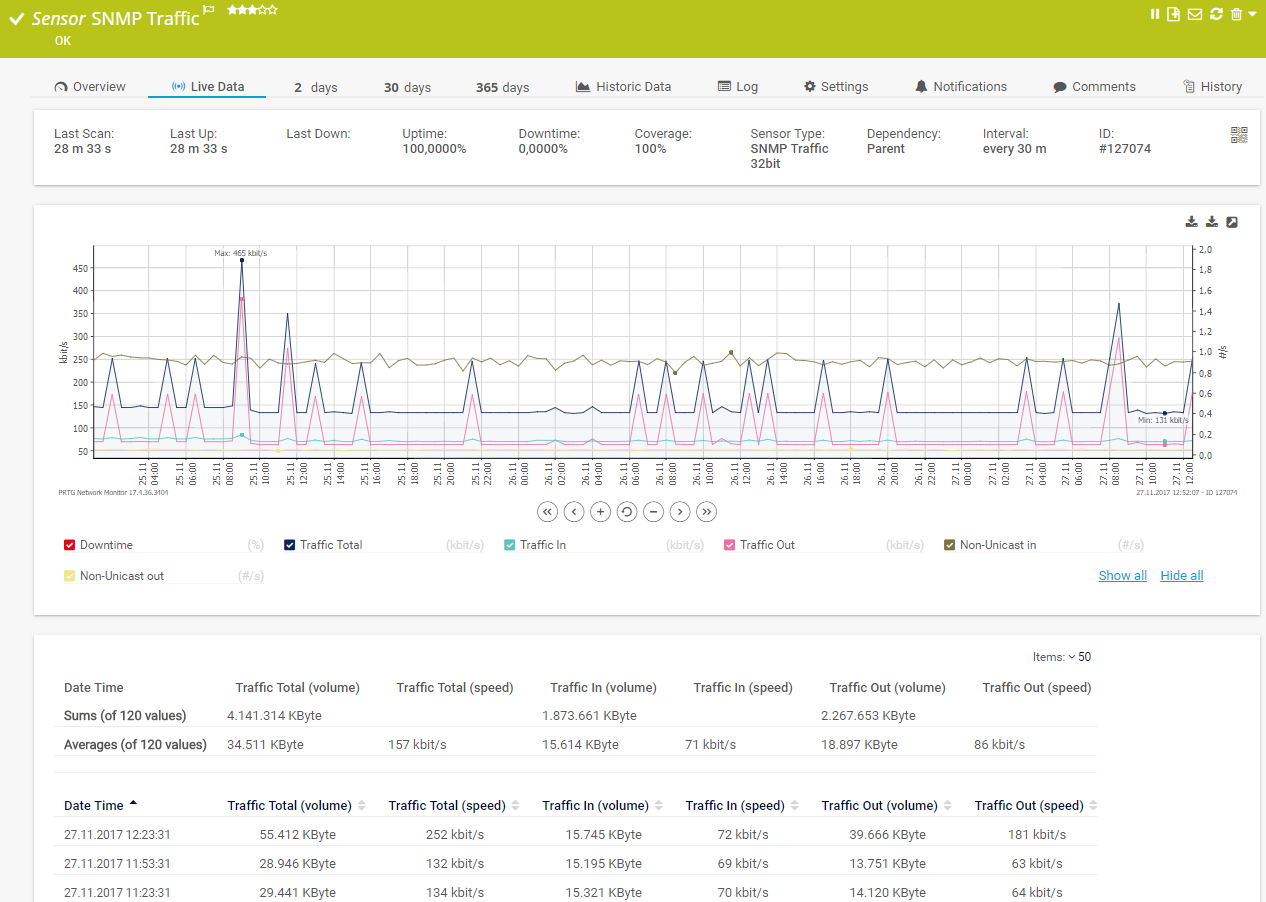
Gráfico de dados de tráfego ao vivo no PRTG
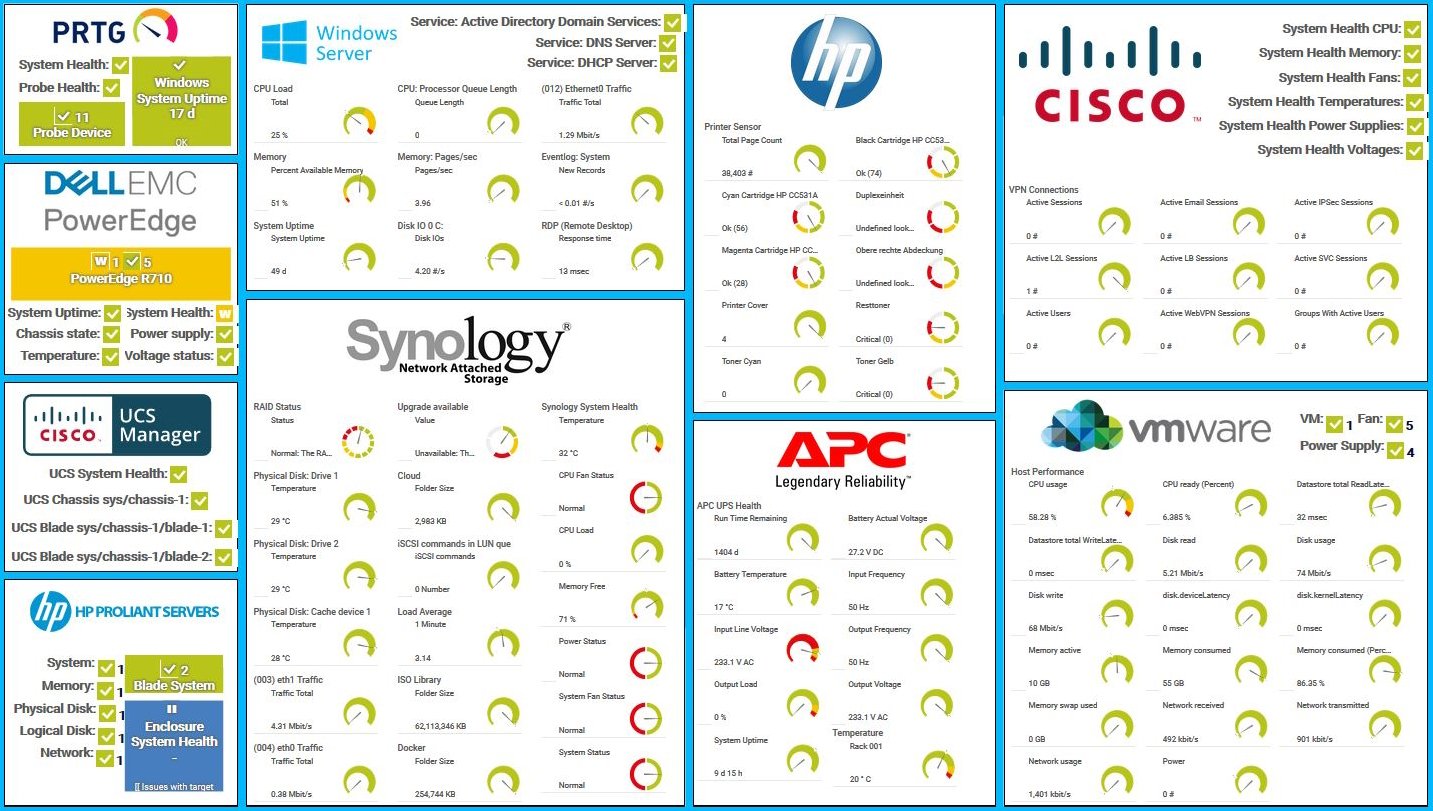
Monitoramento de hardware no PRTG
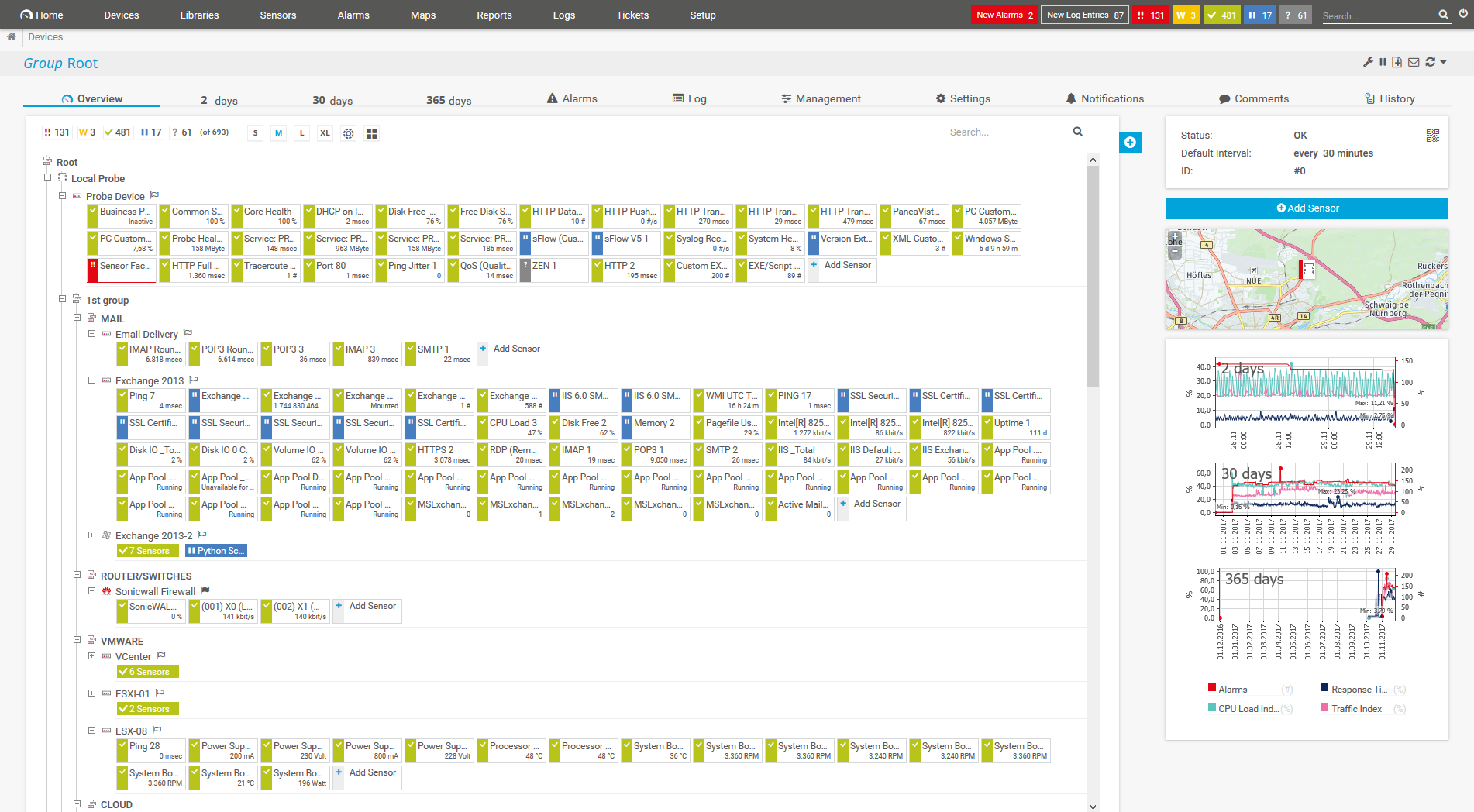
Visualização em árvore de dispositivos da configuração completa de monitoramento
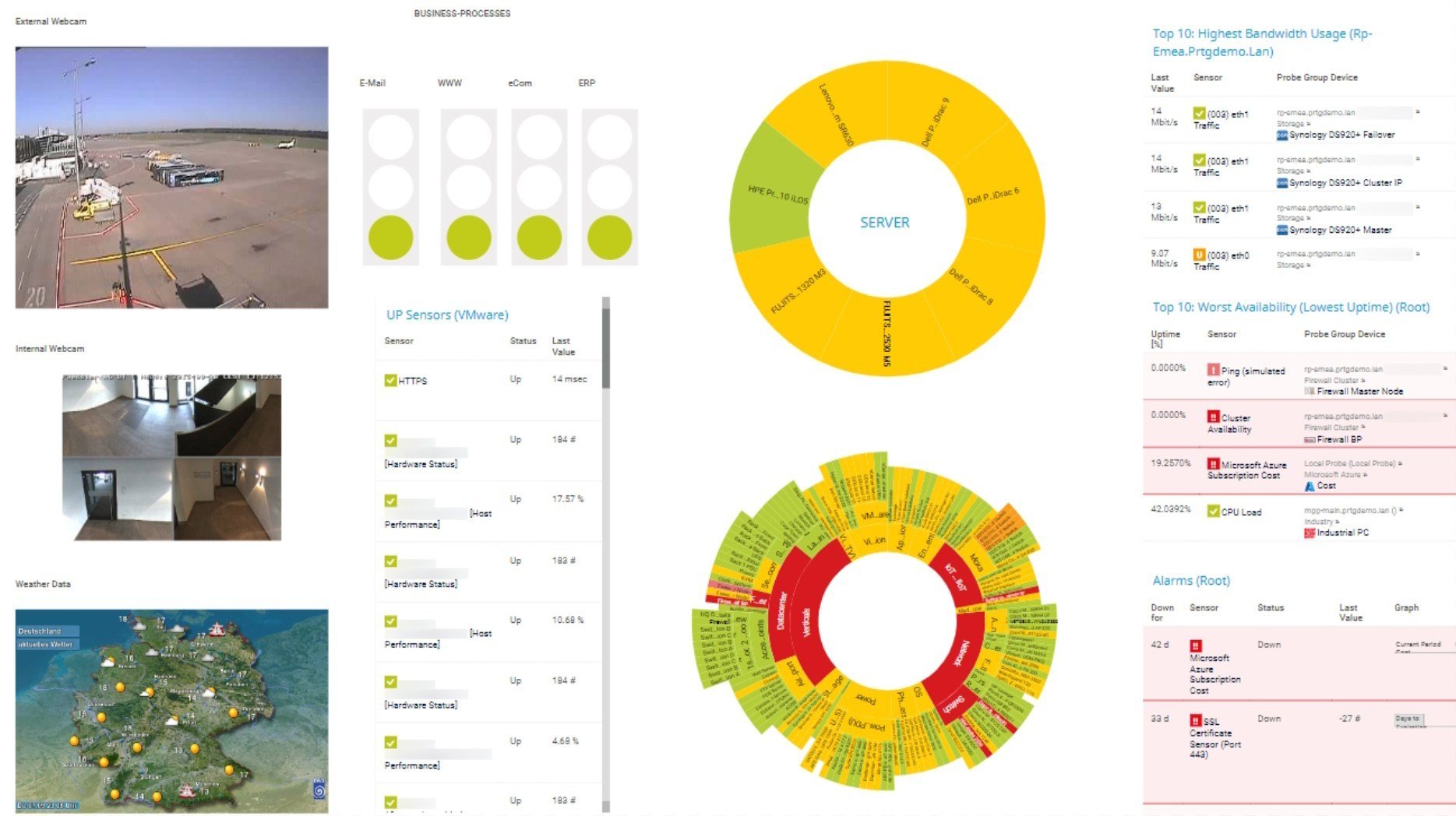
Painel PRTG personalizado para manter um olho em toda a infraestrutura de TI

Gráfico de dados de tráfego ao vivo no PRTG

Monitoramento de hardware no PRTG
O PRTG vem com mais de 250 tipos de sensores nativos para monitorar todo o seu ambiente local, na nuvem e na nuvem híbrida. Confira alguns exemplos abaixo!
Consulte o Manual do PRTG para obter uma lista de todos os tipos de sensores disponíveis.
As notificações em tempo real significam uma solução de problemas mais rápida para que você possa agir antes que ocorram problemas mais sérios.
Alertas personalizados e visualização de dados permitem que você identifique e evite rapidamente problemas de saúde, disponibilidade e desempenho da rede Cisco.
O PRTG é configurado em questão de minutos e pode ser usado em uma ampla variedade de dispositivos móveis.
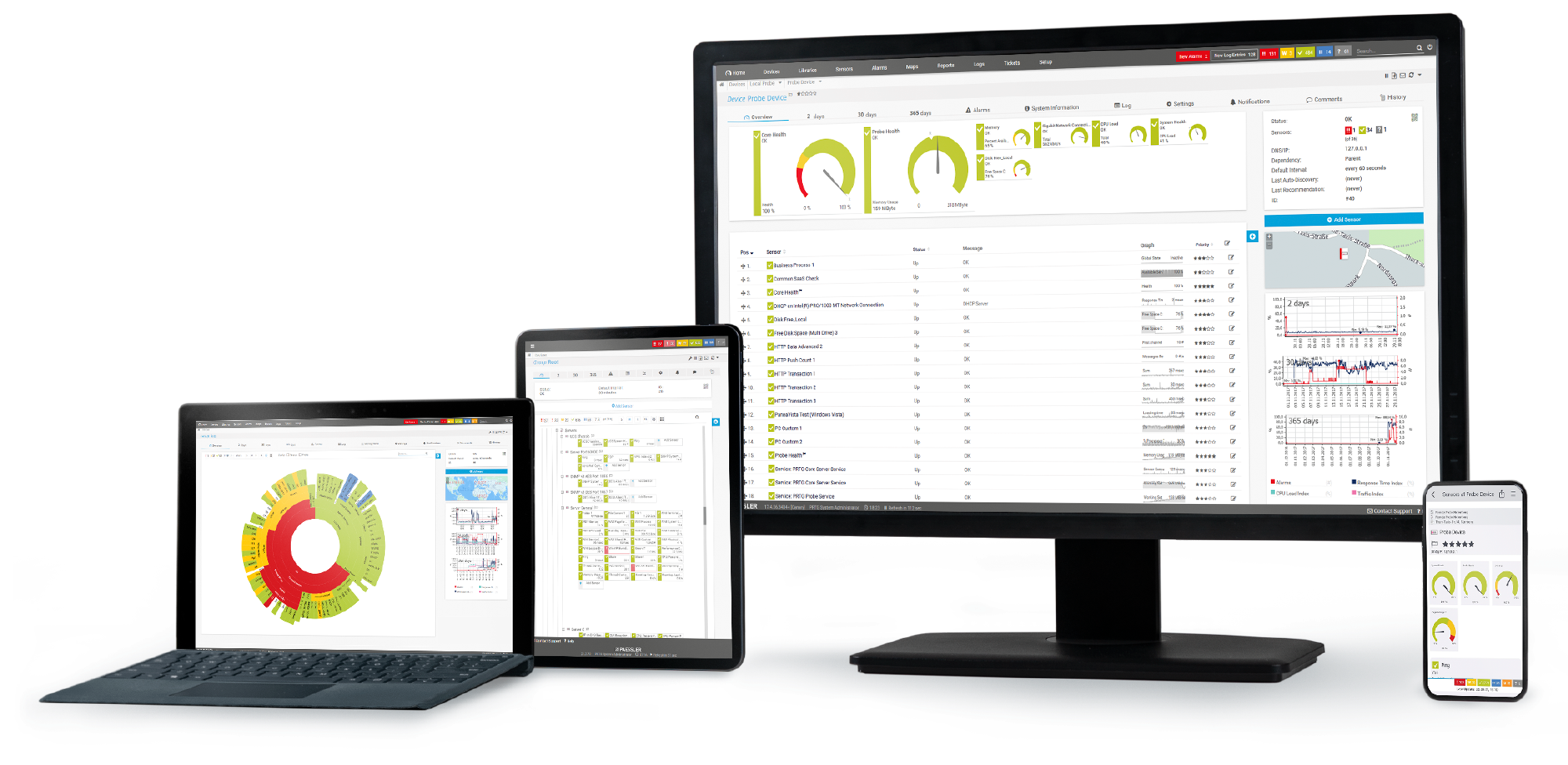

Como membro do Programa de Parceiros da Cisco, a Paessler é uma das líderes de mercado que aprimora o portfólio de tecnologia da Cisco com produtos que comprovadamente se integram facilmente aos dispositivos da Cisco.
O que isso significa para você?
Em parceria com fornecedores de TI inovadores, a Paessler libera sinergias para criar benefícios novos e adicionais para os clientes associados.

A baramundi e o PRTG criam uma infraestrutura de TI segura, confiável e poderosa, onde você tem tudo sob controle - desde o tráfego no seu firewall até a configuração dos seus clientes.
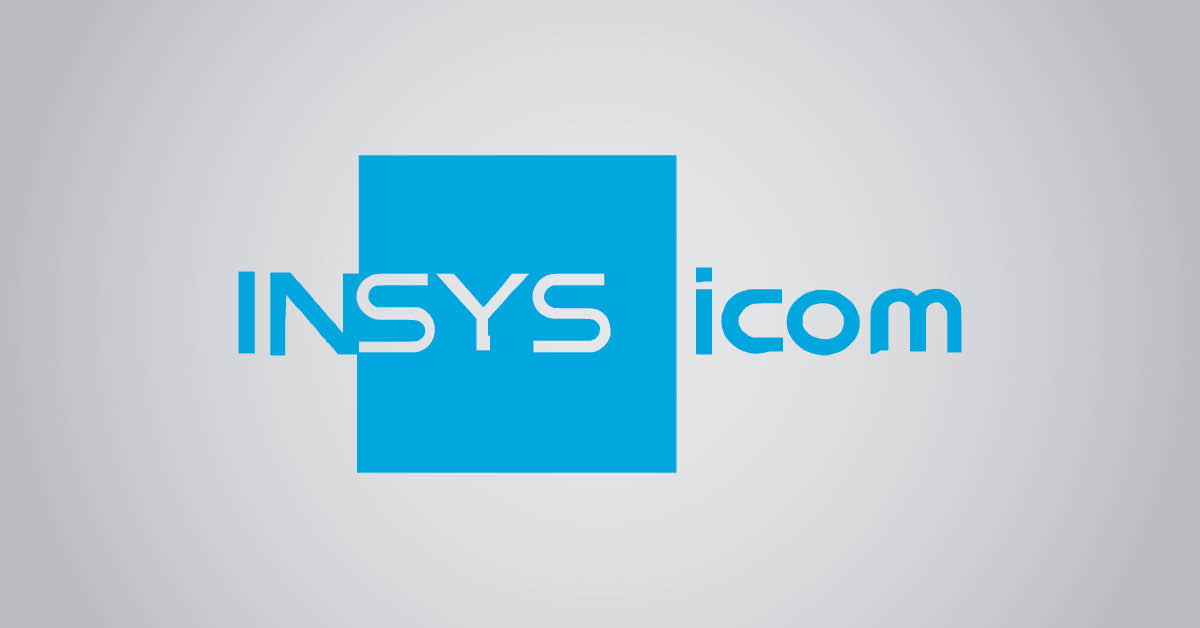
Com a combinação do PRTG e do Insys, a Paessler, especialista em monitoramento, e a INSYS icom, fabricante de gateways industriais, oferecem uma possibilidade prática de unir TI e TO.

A Siemon e a Paessler reúnem tecnologia de construção inteligente e monitoramento avançado e tornam realidade sua visão de edifícios e data centers inteligentes.
As notificações em tempo real significam uma solução de problemas mais rápida para que você possa agir antes que ocorram problemas mais sérios.
Software de monitoramento de rede – Versão 24.4.102.1351 (November 12th, 2024)
Download para Windows e versão baseada em nuvem do PRTG Hosted Monitor disponível
Inglês, alemão, espanhol, francês, português, holandês, russo, japonês e chinês simplificado
Dispositivos de rede, largura de banda, servidores, aplicativos, ambientes virtuais, sistemas remotos, IoT e muito mais
Escolha a assinatura do PRTG Network Monitor que é melhor para você
O monitoramento da Cisco refere-se ao processo de observação e gerenciamento dos dispositivos e serviços de rede da Cisco para garantir o desempenho, a confiabilidade e a segurança ideais. Isso envolve o uso de ferramentas de software especializadas, como o Paessler PRTG, para rastrear a saúde, o status e a atividade de roteadores, switches, firewalls e outros componentes de rede.
As principais métricas incluem o uso da largura de banda, o tempo de atividade do dispositivo, a latência e as taxas de erro. As ferramentas de monitoramento de rede da Cisco ajudam a detectar problemas mais cedo e a se tornar mais proativas na solução de problemas.
O PRTG usa SNMP e tecnologias de fluxo para monitorar os dispositivos Cisco.
SNMP
O Simple Network Management Protocol (SNMP) é a maneira mais fácil de monitorar sua rede. As cargas de rede e CPU são mínimas, no entanto, uma análise com relação ao protocolo ou a um endereço IPS é impossível. Use esse protocolo sempre que puder para monitorar de forma mais eficiente.
NetFlow
O NetFlow é uma tecnologia da Cisco que minimiza o consumo de largura de banda, determinando o uso da largura de banda em um dispositivo e transmitindo-o coletivamente ao PRTG. O NetFlow oferece um maior grau de detalhe (por exemplo, por protocolo de rede/endereço IP) do que o SNMP e, devido ao seu baixo consumo, é ideal para redes Cisco com uma grande quantidade de tráfego.
Encontre perguntas e respostas frequentes sobre o monitoramento da Cisco também em nossa Base de conhecimento:
O próprio software de monitoramento da Cisco, o Cisco Prime Network Analysis Module, não pode monitorar o hardware de outros fabricantes da maneira que o PRTG pode. Como muitos administradores de sistemas gerenciam infraestruturas de TI que contêm hardware de uma variedade de fabricantes, é essencial usar uma ferramenta de monitoramento como o PRTG, que incorpora a tecnologia necessária para monitorar praticamente qualquer hardware. E com o PRTG, você pode visualizar todos os dados de monitoramento juntos em um painel de fácil leitura.
No PRTG, “sensores” são os elementos básicos de monitoramento. Um sensor geralmente monitora um valor medido na sua rede, por exemplo, o tráfego em uma porta de switch, a carga de CPU de um servidor ou o espaço livre em uma unidade de disco. Em média, você precisa de 5-10 sensores por dispositivo ou um sensor por porta de switch.
A Paessler realizou testes em mais de 600 departamentos de TI em todo o mundo para sintonizar seu software de monitoramento de rede mais próximo às necessidades dos administradores. O resultado da pesquisa: mais de 95% dos participantes recomendaria PRTG – ou já o fizeram.
Paessler PRTG é usado por empresas de todos os tamanhos. Os administradores adoram PRTG porque ele facilita muito o trabalho.
Largura de banda, servidores, ambientes virtuais, websites, serviços VoIP – PRTG monitora toda a sua rede.
As necessidades de monitoramento variam. Por isso deixamos você experimentar PRTG gratuitamente. Comece agora mesmo o seu período de testes.